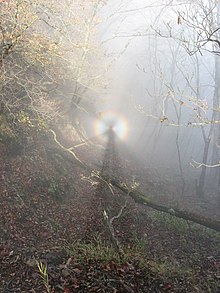The Private Memoirs and Confessions of a Justified Sinner

Brocken spectre with a glory, an atmospheric effect of light which has powerful instrumental effect in one of the scenes from the novel Confessions of a Justified Sinner.
|
|
| Author | James Hogg |
|---|---|
| Country | Scotland |
| Language | English, Scots |
| Genre | Psychological mystery, philosophical novel, satire |
|
Publication date
|
1824 |
| Pages | 210 |
The Private Memoirs and Confessions of a Justified Sinner, (Full title, The Private Memoirs and Confessions of a Justified Sinner: Written by Himself: With a detail of curious traditionary facts and other evidence by the editor) is a novel by the Scottish author James Hogg, published anonymously in 1824.
Considered by turns part-gothic novel, part-psychological mystery, part-metafiction, part-satire, part-case study of totalitarian thought, it can also be thought of as an early example of modern crime fiction in which the story is told, for the most part, from the point of view of its criminal anti-hero. The action of the novel is located in a historically definable Scotland with accurately observed settings, and simultaneously implies a pseudo-Christian world of angels, devils, and demonic possession.
The first edition sold very poorly and the novel suffered from a period of critical neglect, especially in the nineteenth century. However, since the latter part of the twentieth century it has won greater critical interest and attention. It was praised by André Gide in an introduction to the 1947 reissue and described by the critic Walter Allen as 'the most convincing representation of the power of evil in our literature'. It has also been seen as a study of religious fanaticism through its deeply critical portrait of the Calvinist concept of predestination. It is written in English, with some sections of Scots that appear in dialogue.
Many of the events of the novel are narrated twice; first by the 'editor', who gives his account of the facts as he understands them to be, and then in the words of the 'sinner' himself.
The 'Editor's Narrative' starts in 1687 with the marriage of Rabina Orde to the much older George Colwan, Laird of Dalcastle. Rabina despises her new husband because he falls short of her extreme religious beliefs, his love of dancing and penchant for drinking alcohol. She initially flees him but her father forces her back, and they live separately in the one house. Rabina gives birth to two sons. The first, George, is indisputably the son of the Laird, but it is strongly implied – though never confirmed – that her second son, Robert, was fathered by the Reverend Wringhim, Rabina’s spiritual adviser and close confidante.
...
Wikipedia
